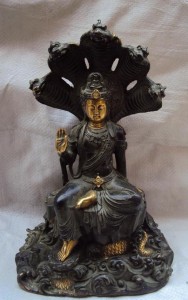For a Lankavatarian, the arrival in the mail of Red Pine’s new translation of the Lankavatara Sutra was like receiving the Holy Grail. This long anticipated release was well-worth the wait. Readers will not be disappointed as this contemporary rendition, through the skillful writing ability of Bill Porter, breathes new life into what is considered a difficult text. I found myself being mesmerized as soon as I opened the book. Often I find myself skipping through a book’s preface to get to the content, but not this time. Red Pine weaves a masterful synthesis of the Sutra’s origins—from the text itself to wonderful anecdotes revolving around key Zen players who were instrumental in the Lanka’s promulgation. One such anecdote relates how Shen-Hsiu, who lost that famous poetry contest with Hui-neng, was actually a greater admirer of the Lanka than the Sixth Patriarch himself; he was even buried beneath a hillock that he affectionately named Mount Lanka.
One salient feature that appears again and again in Bill Porter’s translation is the Sutra’s non-projection of dharmas: “Because the various projections of people’s minds appear before them as objects, they become attached to the existence of their projections.” The way to become free from one’s projections is to realize that “they are nothing but mind” Itself. The Buddha makes Mahamati (the spokesman in the sutra who addresses questions to the Buddha) aware that his incessant inquires are nothing more than “his own and others’ imagination and as such are tantamount to pie in the sky.” Consciousness itself is a “self-fabricated” fiction, but “bodhisattvas transform their consciousness into the projectionless tathagata-garbha, or the womb from which the buddhas arise.” Red Pine is right on target with his understanding of the tathagata-garbha and the alaya-vijnana, the latter “represents the defiled mind”, the former “the mind purified.” He also stresses a point about practitioners: “The Lanka is not a text that welcomes the casual reader. An understanding of its teachings requires a teacher, or incredibly good karma. And such teachers and karma have always been rare. There have been times when the Lanka achieved a certain amount of popularity, but it has never been a text whose readership was widespread—its reputation, yes, but not its readership.” Hence, one can see the validly of his decision to take the reductionist approach in order to enhance the Sutra’s readership.
I am also delighted that Red Pine decided to include the “Introductory Chapter”, something that editions like the Goddard abridged efforts have sorely left out. The interesting and edifying account of Ravana, the Overlord of the Yakshas, being transformed (Bill Porter’s translation of pavavriti—or the “turn about” within the deepest recesses of consciousness) through his discourse with the Buddha, in effect having a Yogic self-awakening, highlights in a nutshell the whole teaching within the Lanka on the process of the self-realization of Noble Wisdom. Am looking forward to reading the rest of Bill Porter’s marvelous and informative translation—his accompanying commentary is an invaluable and enjoyable asset. The only contentious points thus far is his decision to exclude arya-jnana in favor of buddha-jnana—in doing so he misses the authentic import of the true meaning of the “Noble-Ones” who are instilled with the proper Buddha-gnosis to attain that wonderful self-realization of Noble Wisdom…this is not some “personal revelation” as he asserts (personal revelation is akin to what I was describing in my recent blog: The Rapture, wherein a woman had a personal revelation as to the coming “Rapture”). The self-realization of Noble Wisdom found within the Lanka is not a “personal” revelation, but rather a singular divulgement of the Tathatagas. Also, like most contemporary Buddhist scholars, his emphasis upon the “no-self” leaves much to be desired—even though he breaks-down this “self” as being constituted of the Skandhas—he seems, thus far, to be leaning in the direction of pure anātmanism. All in all, a new majestic rendition of the Lanka’s marriage between Yogacarism and Zen—what Red Pine calls, “Zen tea in a Yogacara Cup.”

